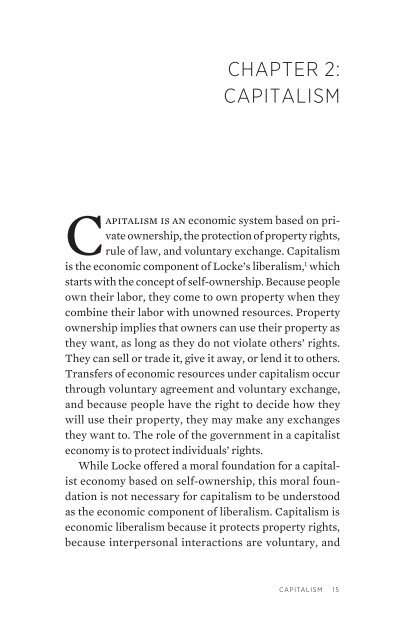url?sa=t&source=web&cd=1&ved=0CCYQFjAA&url=http://mercatus.org/sites/default/files/Holcombe_Cronyism_web
url?sa=t&source=web&cd=1&ved=0CCYQFjAA&url=http://mercatus.org/sites/default/files/Holcombe_Cronyism_web
url?sa=t&source=web&cd=1&ved=0CCYQFjAA&url=http://mercatus.org/sites/default/files/Holcombe_Cronyism_web
Create successful ePaper yourself
Turn your PDF publications into a flip-book with our unique Google optimized e-Paper software.
CHAPTER 2:<br />
CAPITALISM<br />
Capitalism is an economic system based on private<br />
ownership, the protection of property rights,<br />
rule of law, and voluntary exchange. Capitalism<br />
is the economic component of Locke’s liberalism, 1 which<br />
starts with the concept of self-ownership. Because people<br />
own their labor, they come to own property when they<br />
combine their labor with unowned resources. Property<br />
ownership implies that owners can use their property as<br />
they want, as long as they do not violate others’ rights.<br />
They can sell or trade it, give it away, or lend it to others.<br />
Transfers of economic resources under capitalism occur<br />
through voluntary agreement and voluntary exchange,<br />
and because people have the right to decide how they<br />
will use their property, they may make any exchanges<br />
they want to. The role of the government in a capitalist<br />
economy is to protect individuals’ rights.<br />
While Locke offered a moral foundation for a capitalist<br />
economy based on self-ownership, this moral foundation<br />
is not necessary for capitalism to be understood<br />
as the economic component of liberalism. Capitalism is<br />
economic liberalism because it protects property rights,<br />
because interpersonal interactions are voluntary, and<br />
CAPITALISM 15


